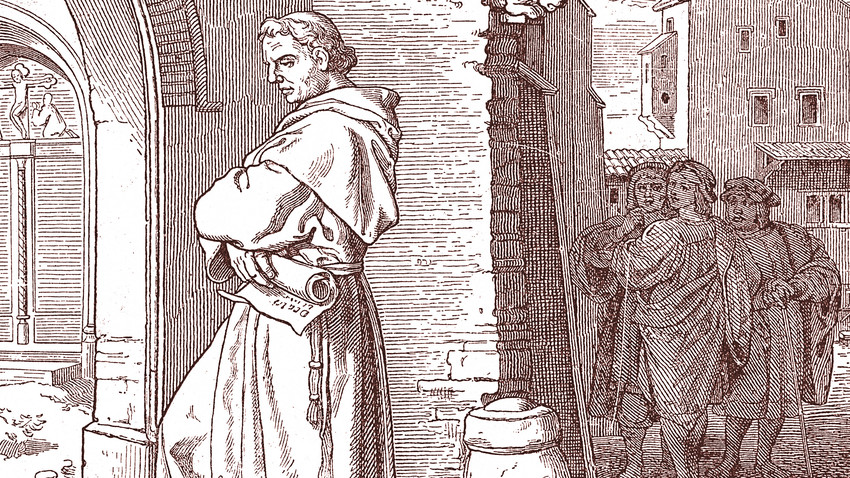
Why Was Luther So Sick?
It’s amazing how much one can learn of Martin Luther’s state of mind—simply because of the prodigious output from his prolific pen, because in every sense of the word his writings went "viral." Johannes Gutenberg’s invention of movable type and the printing press (seventy years before Luther) forever changed the human playing field. "In terms of its cultural impact the printing press was the most significant innovation in world history before the internet" (Derek Wilson Luther: Out of the Storm p. 41). Could it be Someone set the Reformer up for mass communication success years before he was born? "By 1500 every major town and city in Europe had at least one print works and there were already in existence more books than the world had ever seen—some thirty thousand titles, running to over six million copies." Thus it was possible for "'a little mouse like Wittenberg to roar like a lion across the length and breadth of Europe’" (ibid.).
So it isn’t hard to gauge Luther’s state of mind—but what about his state of health? Reading multiple biographies this summer I was stunned to learn how sick Luther was much of the time. Timothy Lull and Derek Nelson detail a painful life of ill health plaguing Martin throughout his adulthood. "He suffered for many years from tinnitus (ringing in the ears) and frequently had dizzy spells and fainting. Once he fainted in a pulpit and fell from it" (Resilient Reformer: The Life and Thought of Martin Luther p. 323). But there was more to come. Luther also suffered from: uremia (a kind of kidney failure), gout (painful joints caused by uremic acid build-up), and kidney stones. Given he lived at the end of the Dark Ages, we shouldn’t be surprised to learn Luther "praised his medicines coming from the Dreckapotheke (excrement pharmacy), including slurries of swine feces for reducing blood flow and horse dung for better breathing. Perhaps not surprisingly they seem not to have helped much" (p. 324). Surprise!
In 1537 Luther’s health tanked even further from a large kidney stone and its attendant bleeding. When he couldn’t urinate, the court’s physician prescribed massive amounts of water. And when this obviously only made matters worse, the doctor tried a mixture of garlic and raw manure. "In excruciating pain, Luther expected—and hoped for—death. Finally relief struck . . . [when] the sharp jostling of his carriage broke the [kidney] stone loose. Over a gallon of urine poured forth uncontrolled. Shocked by his survival, he exclaimed that night, 'Luther lives!’" (ibid.). Surprise!
But the more he aged the more afflicted Martin’s body. "His physical and emotional pain in these last years was so intense he frequently prayed that he be allowed to die" (p. 345). Now added to his list of ailments came a perforated eardrum (which festered with pus for weeks causing an acute inner-ear infection), severe diarrhea and vomiting, an abscess on his throat, his right eye going blind from a cataract, dysentery, rheumatism, and "crippling angina pectoris [chest pain due to coronary disease] episodically from 1540 until his death [1546] " (ibid.).
And yet in the midst of such painful suffering, Luther’s prodigious output of pastoral and theological writings poured forth unabated, as did his unrelenting challenge to Rome and his opponents, all the while shepherding his parish flock (now numbered by the thousands across Germany and even Europe). But therein lies the mystery of suffering, does it not? Do our lives produce fruit "in spite of" our personal suffering, or do they bear fruit "because of" that suffering? Sit down sometime and read 2 Corinthians 11:16-12:10. Brood over this lengthy list of personal trials and intense suffering the apostle Paul cheerfully (seemingly) endured in his peripatetic ministry for Christ. Like Luther he too pleaded to be released from the clutches of suffering. And to him (as no doubt to Luther) came the response of Christ, "My grace is sufficient for you, for My power is made perfect in weakness" (2 Corinthians 12:9).
Paul, Luther, you and I—would that we all might exclaim with the apostle—"Therefore I will boast all the more gladly about my weaknesses, so that Christ’s power may rest on me. That is why, for Christ’s sake, I delight in weaknesses, in insults, in hardships, in persecutions, in difficulties. For when I am weak, then I am strong" (2 Corinthians 12:9-10).
Soli Deo gloria. That He alone might be glorified.